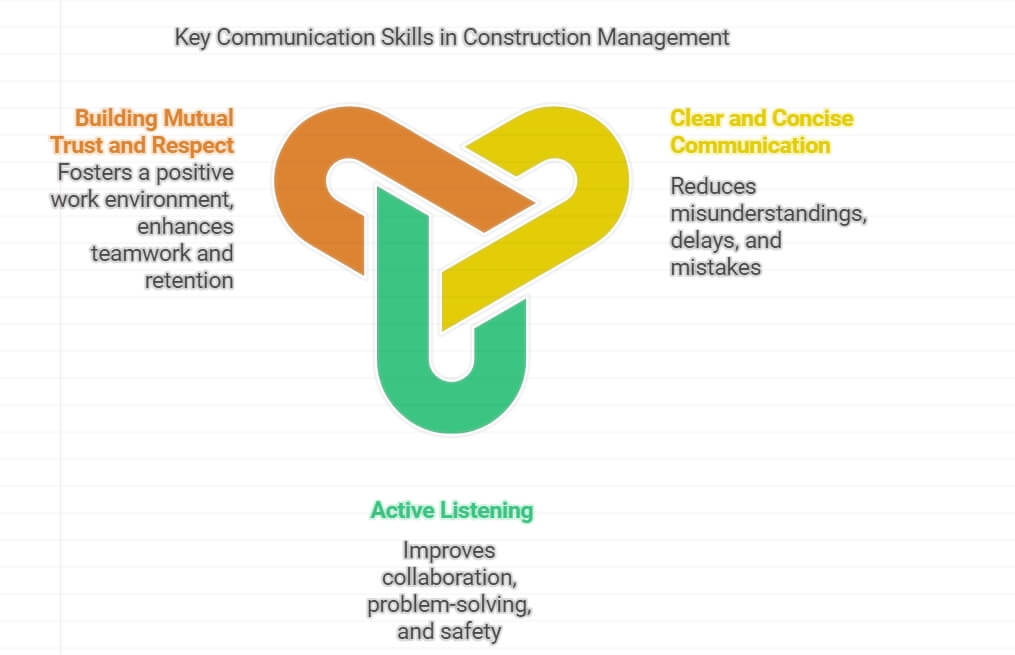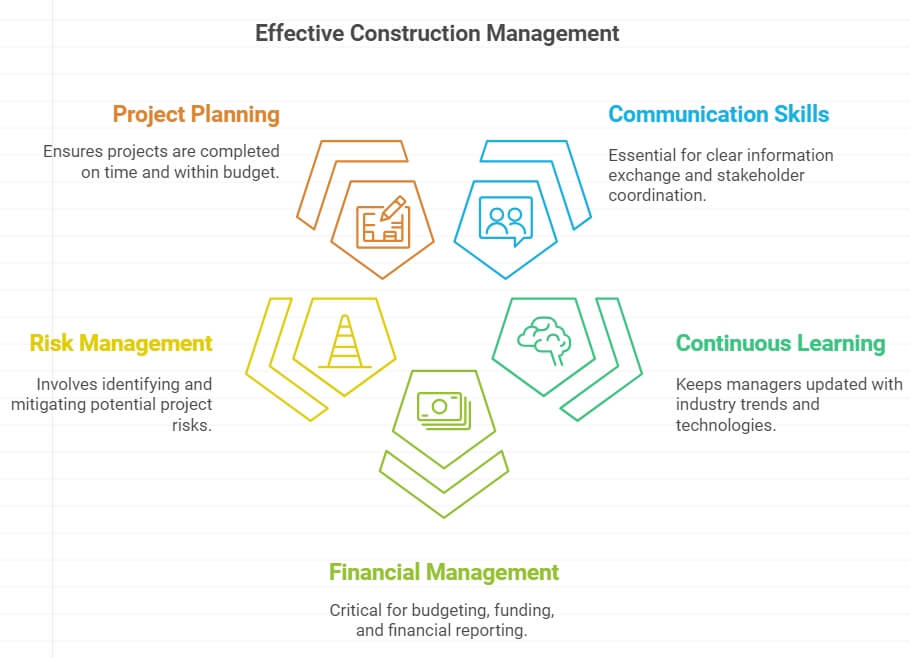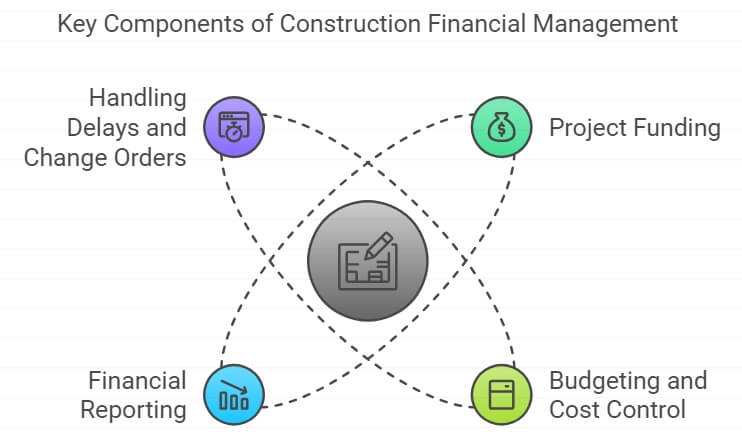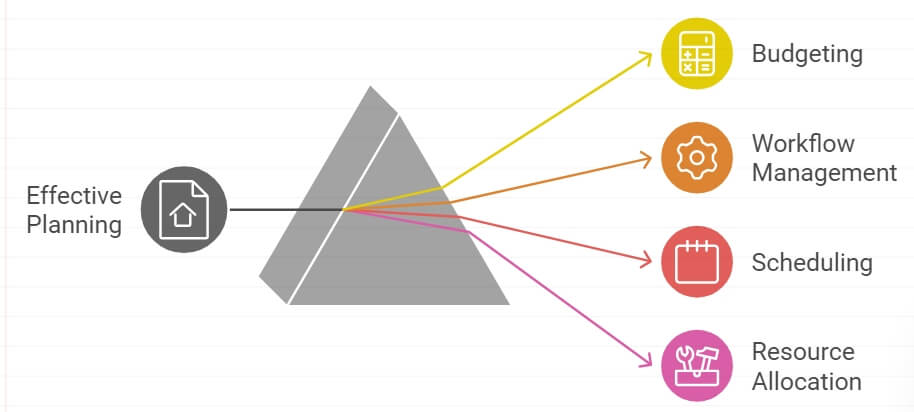Construction project managers oversee complex projects from initial planning to completion, coordinating resources and monitoring progress. Their role demands versatile skills including clear communication, strategic planning, financial management, risk assessment, negotiation, team leadership, and technical expertise. These capabilities allow them to successfully guide construction projects while maintaining quality and safety standards.

Key Takeaways
- Construction managers must have many skills to manage complex projects well.
- Good communication is key to avoiding problems and reaching project goals.
- Always learning and knowing the industry helps managers use the latest methods.
- Managing money well is crucial for handling project finances.
- Handling risks is important to deal with problems that come up during projects.
Effective Communication
Effective communication is key to successful construction management. Construction managers need various communication skills and tools. They must also coordinate project activities and work with stakeholders, which ensures construction projects run smoothly.
They should be good at writing and using online platforms. They need to share messages clearly and listen well to their teams.
Clear and Concise Communication
In construction, clear communication is vital to avoid mistakes and delays. Managers should write professionally and to the point. They should stick to facts and provide accurate info without extra details.
Keeping communication clear and choosing the right methods helps. This ensures everyone involved in the project is informed and in sync.

Active Listening
Effective communication in construction is a two-way street. Listening well during meetings is as important as speaking. By listening, managers understand team roles and concerns better.
This leads to better teamwork and problem-solving. It makes the work environment safer and more productive. It also lowers the risk of accidents and injuries.

Building Mutual Trust and Respect
Creating trust and respect is essential for good communication in construction. Professional communication practices help build a positive project environment. Team members feel valued and heard.
This improves teamwork, and quality, and keeps employees. It helps the construction project succeed.
| Communication Skill | Importance in Construction Management |
|---|---|
| Clear and Concise Communication | Reduces misunderstandings, delays, and mistakes |
| Active Listening | Improves collaboration, problem-solving, and safety |
| Building Mutual Trust and Respect | Fosters a positive work environment, enhances teamwork and retention |
Continuous Learning and Industry Knowledge
The construction industry is always changing. For construction managers, keeping up with these changes is key. They need to learn about new technologies, materials, and rules to manage projects well.
Staying Current with Industry Developments
Good construction managers keep up with the latest trends. They go to conferences, workshops, and webinars to learn. This helps them solve problems and manage projects better.
Gaining Hands-On Experience
Experience is also crucial for construction managers. They learn a lot from working on projects. This experience helps them handle complex tasks.
| Skill Set | Percentage of Construction Managers Considering it Essential |
|---|---|
| Leadership | 75% |
| Communication | 85% |
| Project Management | 90% |
| Time Management | 80% |
| Problem-Solving | 95% |
| Technical Knowledge | 70% |
| Financial Acumen | 75% |
| Risk Management | 90% |
| Collaboration | 85% |
The construction world is always changing. Managers who keep learning and have lots of experience do well. They stay updated and use their knowledge to create successful projects.

Financial Management
Effective construction project management needs a strong grasp of financial management. It’s key to know the funding sources and possible financial challenges. The construction industry often faces cash flow problems. Only 17% of residential construction firms always get paid on time, and only 11% report always getting paid in full.

Understanding Project Funding
Construction managers must know a lot about financial management. They need to understand the different funding options for projects. This includes bank loans, government grants, investor financing, and crowdfunding. Knowing how to use these options is crucial for getting the resources needed to finish a project.
Managing Budgets, Quotes, and Reports
Managing project budgets, quotes, and reports is also vital. Construction managers must be good at estimating costs, tracking expenses, and adjusting budgets as needed. They also need to create detailed financial reports. This keeps everyone informed and builds trust.
Dealing with Project Delays and Change Orders
Construction projects often face unexpected delays and change orders. These can greatly affect a project’s finances. Experienced construction managers must know how to handle these situations, negotiate with stakeholders, and find ways to reduce financial risks. This helps keep projects profitable and avoids financial losses.
| Financial Management Responsibilities | Key Skills |
|---|---|
| Project Funding | Understanding financing options, securing resources |
| Budgeting and Cost Control | Accurate cost estimation, expense tracking, budget adjustments |
| Financial Reporting | Generating comprehensive financial reports, maintaining transparency |
| Dealing with Delays and Change Orders | Negotiation skills, financial risk mitigation strategies |
Mastering construction financial management is crucial for construction project managers. It includes understanding funding, managing budgets and reports, and handling delays and change orders. By improving these skills, construction managers can keep projects financially sound and help their businesses succeed.
Risk Management
Effective construction management means watching for risks and acting fast to prevent them. As a construction manager, spotting and fixing potential problems is key. This includes everything from safety issues to budget problems. Knowing how to handle these risks can turn a project into a success or a big failure.

At the core of good risk management is a thorough risk assessment. Construction managers need to check for all possible risks, like weather delays or material shortages. They make a detailed plan to tackle these risks and lessen their effects.
The RACI chart is a powerful tool for construction managers. It shows who is Responsible, Accountable, Consulted, and Informed. This makes communication clear and helps in managing risks smoothly.
| Risk Factor | Potential Impact | Mitigation Strategies |
|---|---|---|
| Weather delays | Project delays, increased costs | Monitor weather forecasts closely Develop contingency plans for weather-related disruptions Maintain adequate insurance coverage |
| Material shortages | Project delays, budget overruns | Diversify supplier network Maintain adequate inventory levels Explore alternative material options |
| Safety incidents | Injuries, property damage, legal liabilities | Implement robust safety protocols Provide comprehensive safety training for workers Ensure compliance with industry standards and regulations |
By focusing on construction risk management and construction project risk assessment, construction managers can handle the tough challenges of the industry. They can ensure projects are done well, keeping their teams safe and the work quality high.
“Effective risk management is not about eliminating risk, but about managing it to achieve the best possible outcome.” – John Adams, Construction Risk Management Expert
Project Planning
Effective construction project planning is key to success. It involves setting budgets, streamlining workflows, and coordinating schedules and resources. This ensures projects are finished on time, within budget, and meet quality standards.

Establishing Budgets and Cost Savings
Accurate cost estimation is vital for a project’s financial success. Construction managers must create detailed budgets for all costs, like labor, materials, and overhead. Good planning can find ways to save money, like buying in bulk or using resources wisely.
Streamlining Workflows and Increasing Productivity
Construction projects are complex, involving many stakeholders. Using construction management software can improve communication and data management. This boosts productivity, reduces mistakes, and makes projects run smoother.
Coordinating Schedules and Resource Allocation
Good scheduling and resource use are crucial for success. Managers must plan project schedules carefully, considering critical paths and labor availability. They also need to assign the right workers to tasks at the right time, making the most of resources and avoiding delays.
| Key Benefits of Effective Construction Project Planning | Metrics |
|---|---|
| Reduced project costs and increased cost savings | 20-30% cost savings on average |
| Improved project schedules and on-time completion | 15-20% reduction in project duration |
| Enhanced productivity and workflow efficiency | 25-35% increase in worker productivity |
| Better resource utilization and allocation | 10-15% reduction in resource waste |
By honing their project planning skills, construction managers can manage their projects well. They can deliver successful results for their clients and stakeholders.
Negotiation Skills
In the world of construction, a good project manager must be great at negotiating. They work with many people like architects, engineers, and clients. They need to talk well, solve problems, and find solutions that everyone can agree on.
Coordinating with Stakeholders
Construction projects have many people involved, each with their views. Good project managers know how to work with these people. They listen well, understand others, and find ways to meet everyone’s needs without losing sight of the project’s goals.
Facilitating Communication Among Teams
Good communication is key to a successful project. Project managers need to make sure everyone is talking openly. This helps solve problems early and keeps everyone working towards the same goals.
| Negotiation Skill | Benefit to Construction Managers |
|---|---|
| Preparation and Research | Analyze market data, industry standards, and legal regulations to strengthen negotiation position. |
| Active Listening | Understand the other party’s perspective, interests, and emotions to find mutually beneficial solutions. |
| Assertiveness and Adaptability | Express needs confidently while remaining flexible to achieve win-win outcomes. |
| Emotional Intelligence | Manage emotions during negotiations to maintain judgment, behavior, and communication effectiveness. |
| Evaluation and Improvement | Continuously refine negotiation skills and strategies based on lessons learned. |
Negotiation skills are crucial for project managers. They help manage teams and deal with many people. With these skills, managers can handle the challenges of construction, protect the project, and finish it successfully.
“Successful construction managers possess a keen understanding of potential risks and develop strategies to mitigate them.”
Team Management and Leadership
Effective construction project management is not just about technical skills. It also needs strong team management and leadership. Construction projects have many teams, like upper management and contractors. Good construction managers know how to make these teams work well together.
Creating a Positive Work Environment
A positive work culture is key to success. Construction managers should build trust and encourage open communication. Giving resources and chances for growth motivates the team and boosts morale.
Motivating and Influencing Teams
Strong leadership is vital for construction team management. Effective construction managers inspire and guide their teams. They align goals and visions, using clear communication and trust-building strategies.
Learning and self-reflection are crucial for construction manager leadership skills. By seeking feedback and staying updated, managers can improve their leadership. This drives project success.
“The true measure of a leader is not how many followers you can get, but how many leaders you can create.” – John C. Maxwell
Conclusion
Effective construction management requires a wide range of skills. These skills help construction managers plan, design, and finish projects well. They include good communication, learning always, managing money, avoiding risks, and leading teams.
Construction managers need to know a lot about construction management skills, construction manager responsibilities, and construction project management. They must direct resources, work with stakeholders, and handle the tough challenges in the construction world. By improving these skills, managers can make projects more efficient, productive, and successful.
Mastering these skills lets construction managers lead their teams, reduce risks, and achieve great results. This helps finish projects that meet or go beyond what clients and stakeholders expect.
FAQ
What are the essential skills for effective construction management?
Key skills include good communication, learning, and knowing the industry. Also, managing money, risks, and planning projects are important. Negotiation and leading teams are crucial too.
Why is effective communication a critical skill for construction managers?
Good communication is vital for construction managers. They need to use many tools to talk to everyone involved in a project. Being clear, listening well, and building trust are key.
How can construction managers stay current with industry developments?
Staying updated is important. Managers should learn new skills and keep up with the latest in the field. Experience and knowledge help them understand projects and the industry’s direction.
Why is financial management an essential skill for construction managers?
Managing a project’s money is crucial. Managers need to know about funding and financial issues. They should understand budgets, quotes, and how to handle delays and changes.
What is the importance of risk management in construction management?
Identifying and planning for risks is key. Managers must have a risk plan and report on it. This skill helps them manage risks and communicate better.
What are the key aspects of project planning for construction managers?
Planning is vital for success. Poor planning can halt a project, while good planning saves money and boosts productivity. Managers need to plan well and use software to coordinate.
Why are negotiation skills important for construction managers?
Negotiation is crucial due to the project’s complexity and many stakeholders. Managers must negotiate well to keep projects on track.
What team management and leadership skills are crucial for construction managers?
Managing teams is essential. Managers need to understand team dynamics and create a positive work environment. They must also lead and motivate their teams.
Sources
- Top 5 skills for construction project managers in 2023 – https://buildertrend.com/blog/construction-project-manager-skills/
- Risk: The Policy Implications of Risk Compensation and Plural Rationalities” published book, Risk
- Essential Skills for Construction Project Managers; 2024 Guide – Neuroject – https://neuroject.com/construction-project-manager/
- 6 Keys to Better Construction Communication – https://www.constructconnect.com/blog/6-keys-better-construction-communication
- The Importance of Effective Communication in Construction Management – https://mrinetwork.com/hiring-talent-strategy/the-importance-of-effective-communication-in-construction-management/
- Effective Communication In Construction Management | ITI College – https://iticollege.edu/blog/effective-communication-in-construction-management/
- How to Become a Construction Manager: A Step-by-Step Guide – https://www.oshaonlinecenter.com/articles/construction-manager-guide
- Construction Manager Skill Sets For Success | ITI College – https://iticollege.edu/blog/skill-sets-a-construction-manager-needs/
- 10 Essential Skills Every Construction Manager Should Master – Parker Brent – Training for Building and Construction – https://www.parkerbrent.com.au/blog/10-essential-skills-every-construction-manager-should-master/
- Key Construction Project Manager Skills | CTC – https://contractortrainingcenter.com/blogs/news/why-your-construction-project-manager-skills-matter?srsltid=AfmBOor0MZm_6EVATbZ4_QybZtB9T41A5EYS60cRNhutK3mcTFXqU3Ow
- Project Financial Management: Strategies for Project Success – https://productive.io/blog/project-financial-management/
- Master the Blueprint: Top 6 Construction Management Skills — Constructor Magazine – https://www.constructormagazine.com/online-exclusives/master-the-blueprint-top-6-construction-management-skills
- 7 Construction Management Skills You Should Practice – https://gocodes.com/construction-management-skills/
- Construction project management processes: Everything you need to know – https://www.letsbuild.com/blog/construction-project-management-processes
- Learn The Importance Of Construction Project Management – https://www.rib-software.com/en/blogs/construction-project-management


I аbsolսteⅼy love your blog and find the majority of yoսr post’s tօ be what precisely I’m looking for.
Would y᧐u offer gᥙest ԝriters to write cⲟntent aѵailable for you?
I woսldn’t mind composing a post or elaboгating on a lot of the suЬjects you
write c᧐ncerning here. Agаin, awesome website!
I go to see every day a few sites and websites to read content, except this webpage gives quality based articles.
Excellent post. I am dealing with some of these issues as well..
Interesting page. I really like the topic discussed here. I’ll come back from time to time for more postings like this one.
This is a great page. It’s very engaging and well organized. I’ll come back from time to time for more posts like this one.